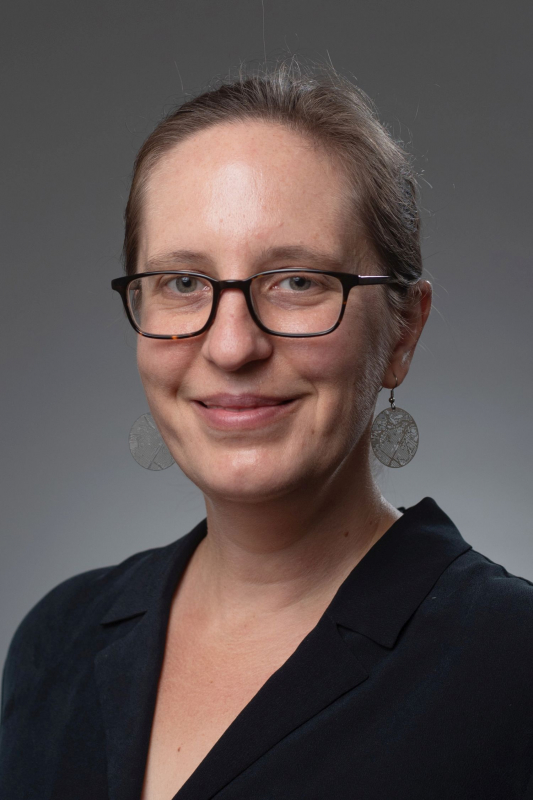Being elected to Fellow status as part of the 2022 class for the American Physical Society for Jacinta C. Conrad – Frank M. Tiller Professor in the William A. Brookshire Department of Chemical and Biomolecular Engineering at the Cullen College of Engineering – was “incredibly special,” given the positive effect the organization had on her development.
“APS was my first professional home and remains an important professional community for me,” she said. “I gave my first talk as a Ph.D. student at the March 2001 meeting in Seattle. I’m the current Chair of the Division of Soft Matter (DSOFT), in the third of a four-year stint in its chair line.”
Although she serves as chair of that division, she noted that most APS members participate across divisions, and she was nominated for Fellow status by another group.
“The Topical Group on Statistical & Nonlinear Physics (GSNP) was the Unit that nominated me,” she said. “In addition to DSOFT and GSNP, I am a member of DPOLY for polymers, DFD for fluids, and DBIO – biophysics – because my group works in all these areas. As DSOFT Chair, I coordinate with the leaders of these other Units to ensure that we have great programming at the March meeting and that our voices are heard as part of the physics community.”
Indeed, Conrad’s Fellow citation – “for experimental contributions to understanding nanoparticle dynamics, bacterial adhesion, and colloid-polymer mixtures, using advanced microscopy and light scattering techniques” – reflects the breadth of her group’s research activities.
According to the program’s website, APS Fellowship was created to recognize members who may have made advances in physics through original research and publication, or made significant innovative contributions in the application of physics to science and technology. They may also have made significant contributions to the teaching of physics or service and participation in the activities of the Society.
Each year, no more than one half of one percent of the Society’s membership is recognized by their peers for election to the status of Fellow of the American Physical Society. Conrad is the 15th member of the University of Houston faculty to receive the honor. Claudia Ratti, an associate professor in the Physics Department received the honor in 2021, and the last engineering faculty member recognized was Jiming Bao of Electrical and Computer Engineering in 2019.
Conrad said that as part of the APS, she has pushed for more diverse representation among the membership body, and to recognize the achievements of members.
“I co-authored an editorial offering suggestions for how to increase demographic diversity among the Fellows, to reflect the demographic representation in APS as a whole,” she said.
Conrad highlighted the importance of APS membership for engineers – as a way to remain cognizant of developments in the often complementary field of physics, as well as a way for students to gain experience with public speaking.
“As a physicist in an engineering department, I find that more of my engineering colleagues attend the yearly March meeting because it’s a wonderful place for students to learn to give talks – they are short, 10 minutes plus two minutes for questions – and to gain a broader perspective on the very latest results in the field – often last week’s data!”
She added, “I also note that UH ChBE has great representation at APS and as Fellows. My colleagues Alamgir Karim, Ramanan Krishnamoorti and Peter Vekilov are also APS Fellows, and several other of my colleagues also attend the March Meeting – Megan Robertson, Jeremy Palmer. In Engineering, Jiming Bao (EE) and Andrea Prosperetti (ME) are also Fellows.”
Going forward, Conrad’s research plans reflect the breadth of activities noted in her Fellow citation. Indeed, she noted that it is a bit of a “muddle” because of the wide array of different colleagues she's working with now.
“Generally, we work on problems involving flow and transport of complex fluids – usually but not always polymers – that contain small particles. From a physics standpoint, Jeremy Palmer and I continue to collaborate to study transport in polymer solutions and surface-grafted brushes, and I was invited to 2023's March Meeting to talk about our collaborative computational work on transport in glassy matrices. We have an article submitted, and my student Peter Edimeh has starting to do experiments to complement the simulations.”
“Megan Robertson and I just resubmitted an experimental paper using polymer brushes as antifouling surfaces. Peter Vekilov and I are working on a paper using colloidal models to explore crystallization from solution based on the work of our student Gary Chen. My student Farshad Safi just had an article accepted examining the physics of virus transport in polymer solutions, inspired by an ongoing collaboration with Richard Willson that is more focused on applications (on lateral-flow diagnostic assays, led by our student Maede Chabi), and will start writing a manuscript about virus transport in DNA solutions (the collaboration started at this year’s March Meeting). My student Mariah Gallegos is drafting a paper to characterize the aggregation of colloidal particles bridged by polymers. My student Diego Soetrisno has a late-stage manuscript in preparation looking at extensional flow (extrusion) of polymer solutions, and I’m speaking in my friend’s award session at APS next spring about this collaborative work. Finally, I’m working with Patrick Cirino to engineer bacteria to change how they adhere to interfaces. Our student Udayanishi Ramesh Kumar is just starting to assemble the figures for our first manuscript there."
